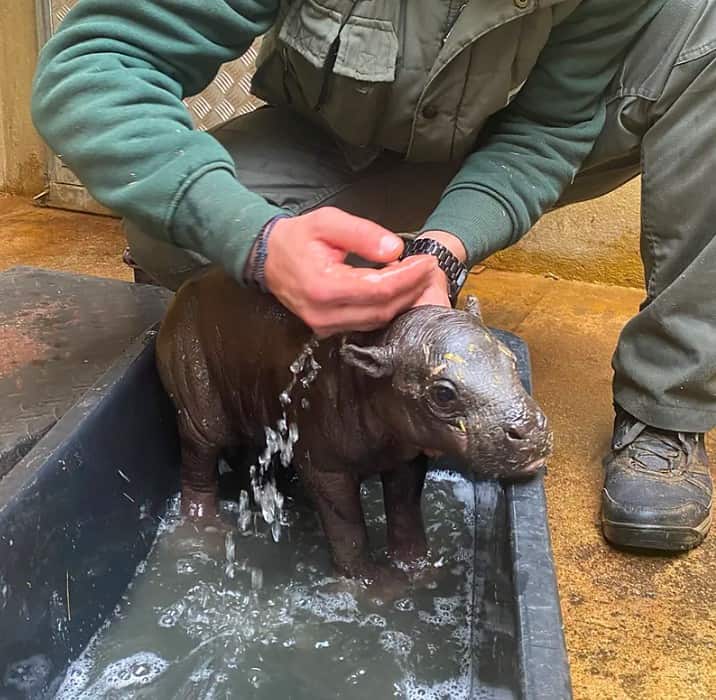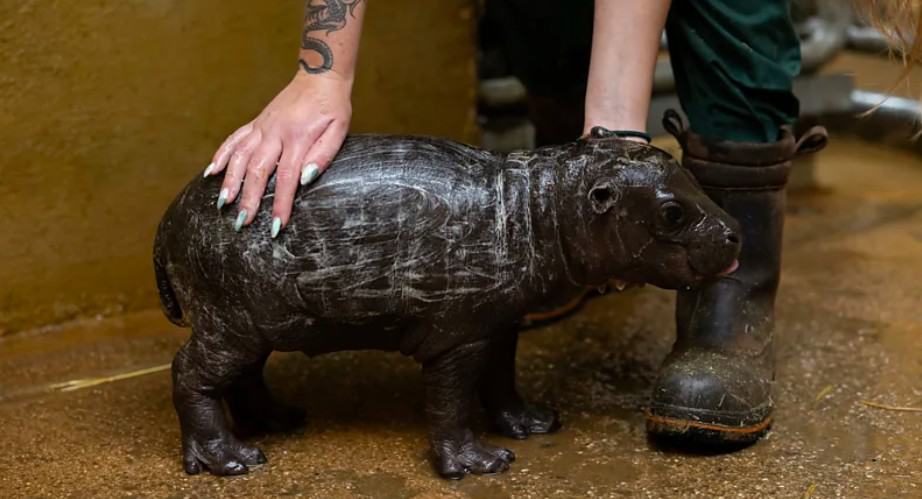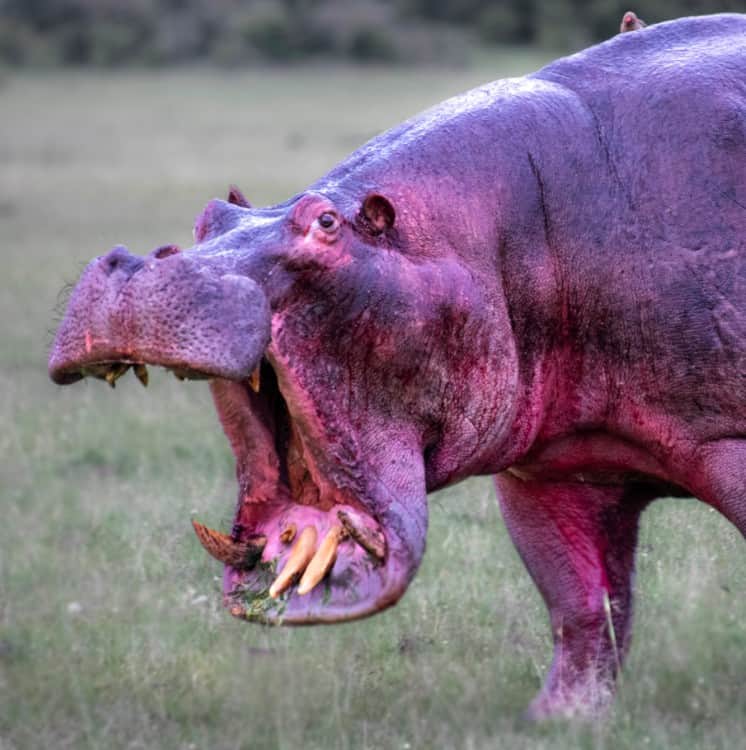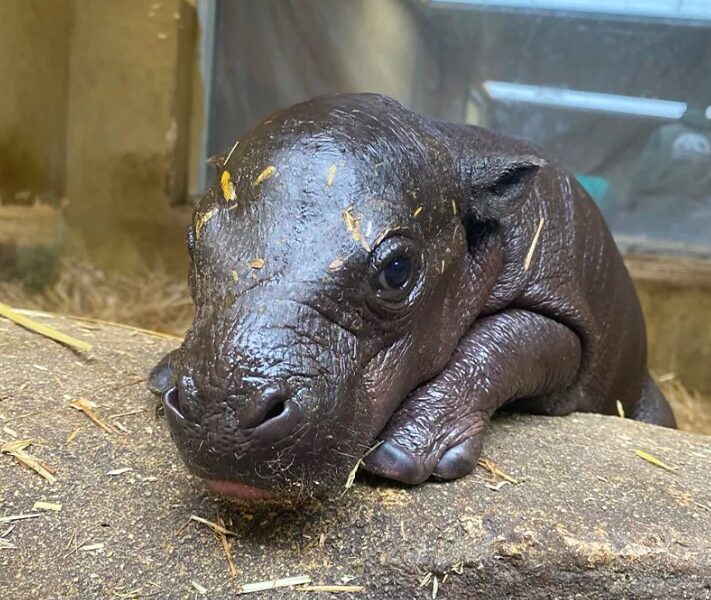A rare and endangered pygmy hippopotamus has been born at the Attica Zoological Park in Athens, Greece, sparking joy among conservationists striving to safeguard the species.
The birth of this newborn is particularly significant given the endangered status of the species, making it a cause for celebration for those dedicated to conserving and rebuilding its population. Remarkably, this birth represents the first pygmy hippopotamus arrival at this zoo in over a decade.
Repopulating the pygmy hippopotamus species has posed challenges due to a scarcity of male pygmy hippos in captivity. Therefore, the birth of this yet-to-be-named baby brings heightened excitement, especially considering its gender. Peter Gros, a renowned wildlife expert, emphasises the significance of this event, stating that each new addition holds potential for the species’ survival. Pygmy hippos typically give birth to a single calf after a gestation period of approximately 6 to 7 months, making the newborn a valuable contribution to conservation efforts. A similar sense of enthusiasm surrounded the recent birth of Mikolas, a male pygmy hippo born in December 2023 at the Dvur Kralove Zoo in the Czech Republic.
The newborn pygmy hippo at Attica Zoological Park will remain in close proximity to its mother for several months before venturing into the outdoor enclosure. Indigenous to swamps and rainforests in western Africa, the pygmy hippopotamus population in the wild is estimated to be between 2,000 to 2,500 individuals. With only a dozen pygmy hippos born in zoos in 2023, and fewer surviving, each birth holds immense importance in efforts to bolster the species’ numbers.
Conservation Challenges: Saving the Pygmy Hippo Species
Breeding pygmy hippos in captivity requires intricate care. Experts and biologists employ various strategies to ensure the comfort and well-being of the animals in an environment resembling their natural habitat. Alicia Hoogenboom, head keeper of Savannah at Attica Zoological Park, shares insights into the careful preparations leading to the birth. The team closely monitored the expecting mother, conducting ultrasounds and routine health checks to ensure a smooth delivery. The birth of the healthy baby boy on February 19, 2024, weighing 7 kilograms, marked a significant milestone in conservation efforts.
That it is a male pygmy hippo holds particular importance due to the scarcity of male individuals in captivity. As efforts continue to safeguard endangered species, zoo breeding programmes play a crucial role in conservation. These programmes have successfully rescued various species from the brink of extinction, such as the Golden Lion tamarin and the California Condor. In New Zealand, concerted conservation efforts led to the recent birth of two wild brown kiwi chicks in Wellington, marking a historic milestone in the preservation of this flightless bird species.


Size Matters: Putting Hippos in Perspective
The pygmy hippopotamus (Hexaprotodon liberiensis) is a smaller relative of the common hippopotamus (Hippopotamus amphibius) native to the forests and swamps of West Africa. While the common hippopotamus is renowned for its large size and aggressive nature, the pygmy hippo is significantly smaller and less aggressive, with full-grown individuals typically weighing between 180 to 275 kilograms (400 to 600 pounds) and standing about 75 to 85 centimetres (30 to 34 inches) tall at the shoulder. In comparison, the common hippopotamus can weigh anywhere from 1,300 to 1,500 kilograms (2,900 to 3,300 pounds) and stand around 150 centimetres (59 inches) tall at the shoulder, making the pygmy hippo one of the smallest members of the hippopotamus family. They primarily feed on a diet of grasses, fruits, and aquatic plants.
According to reports from the World Health Organization (WHO) and National Geographic, common hippos are indeed one of the most dangerous animals in Africa and are responsible for more human fatalities than any other large animal on the continent, primarily due to territorial disputes and perceived threats to their young. In comparison, pygmy hippos are generally shy and reclusive, preferring to stay hidden in dense vegetation near water sources. with very few reported incidents of the species displaying aggressive behaviour towards humans.


The birth of the pygmy hippo at the Attica Zoological Park signifies a triumph for conservationists and a step forward in safeguarding the endangered species. Through collaborative efforts and dedicated care, zoos continue to play a vital role in preserving biodiversity and protecting vulnerable species for generations to come.
Photo credits: Attica Zoological Park
Read also Athen’s Troon Street Named One of World’s Coolest Streets
Read also: Musk’s Bold Predictions: AI to Surpass Combined Intelligence of the Human Race by 2029


